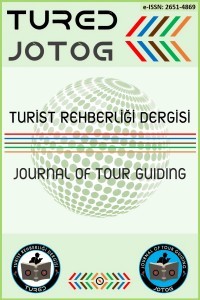Dünyada Turist Rehberliği Eğitimi
Amaç ve Önem: Çalışmanın amacı dünyada en çok turist çeken ülkelerde turist rehberliği eğitiminin nasıl verildiği ve nasıl turist rehberi olunduğunu ortaya koymaktır.Yöntem: Çalışmada alan yazın taraması yapılarak içerik analiz yönteminden yararlanılmıştır.Bulgular: Yapılan literatür taraması ile Dünya Turizm Örgütü (WTO) 2018 yılı verilerinden yararlanarak dünyada en çok ziyaret edilen ülkeler ve turizmde yükselişte olan ülkelerin turist rehberliği eğitim sistemleri incelenmiştir. Amerika Birleşik Devletleri ve Fransa’da mesleğin icrası için profesyonel eğitim şartı aranmamaktadır. Eğitim süresi en kısa 3 hafta ile Güney Afrika Cumhuriyeti, en uzun ülke ise 5 yıl ile Arjantin’dir. Elde edilen bulgulara göre Avrupa’da turist rehberliği eğitimi 3 ay ile 2 yıl arasında değişmektedir. Verilen eğitimler incelendiğinde ortak olan konulardan Bazıları Tarih, Sanat Tarihi, Dinler Tarihi, Arkeoloji, Coğrafya, Mitoloji, Sosyoloji ve Toplum Bilimidir. Özgünlük/ Bilimsel Katkı: Dünyada turist rehberliği eğitimi veren ülkelerin verdikleri eğitimler açısından ele alınmasını ve değerlendirilmesini kapsamaktadır.
Anahtar Kelimeler:
Turizm rehberliği, turist rehberliği, turist rehberliği eğitimi
Tourist Guidance Education in the World
Purpose and Importance: The aim of this study is to show how tourist guidance education is given and how to become a tourist guide in the countries that attract the most tourists.Methodology: Literature review and content analysis method were used in the study.Findings: With the literature search, the World Tourism Organization (WTO) data of the year 2018 were examined and the tourist guidance education systems of the most visited countries and the emerging countries in tourism were examined. In the USA and France Professional training is not required for the exercise of the profession. The shortest period of study is the Republic of South Africa with 3 weeks and the longest is Argentina with 5 years. According to the findings, tourist guidance education in Europe varies between 3 months and 2 years. When the given educations are examined, some of the common subjects are History, Art History, History of Religions, Archeology, Geography, Mythology, Sociology and Social Science Originality/Value: The study covers addressing and evaluating educations of the countries that provide tourist guidance education in the World.
Keywords:
Tourism guidance, tourist guidance, tourist guidance education,
___
- Ahipaşaoğlu, S. (2006). Turizmde Rehberlik. Ankara: Gazi Kitabevi.
- Carmody, J.(2013). “Intensive Tour Guide Training In Regional Australia: An Analysis of The Savannah Guides Organisation and Professional Development Schools”. Journal of Sustainable Tourism, 21(5), 679-694.
- Cohen, E. (1985). “The Tourist Guide: the Origins, Structure and Dynamics of a Role”. Annals of Tourism Research, 12, 5-29.
- El-Sharkawy, O. K., (2007). “Knowledge And Skills For Tourist Guides: Evidence From Egypt”. Tourismos: An International Multidisciplinary Journal of Tourism, 2(2), 77 -94.
- Gorenak, M. ve Gorenak, I. (2012). “Challenges In Educatıon of Tour Guides And Tour Managers”. University of Maribor Faculty of Logistics, (45), 287-296.
- Lovrentjev, S. (2015). “Education of Tourist Guides: Case of Croatia”. Procedia Economics and Finance, 23,555-562.
- Mason, P.A. ve Christie, M.F. (2003). “Tour Guides as Critically Reflective Practitioners: A Proposed Training Model”. Tourism Recreation Research, 28 (1), 23-33.
- Nyahunzvi, D. K. ve Njerekai, C. (2013). “Tour Guiding in Zimbabwe: Key Issues and Challenges”. Tourism Management Perspectives, 6, 3-7.
- Pond, K. (1993). The Professional Guide: Dynamics of Tour Guiding. New York: Van Nostrand Reinhold.
- Rabotić, B. (2010).“Tourist Guides In Contemporary. Tourism International Conference On Tourism and Environment”, Philip Noel-Baker University, Sarajevo, Bosnia & Herzegovina, 4-5 March 2010, pp.353-364.
- Rabotić, B. (2011). “American Tourists’ Perceptions of Tourist Guides in Belgrade”. UTMS Journal of Economics, 2 (2), 151–161.
- Yenipınar, U. ve Zorkirişci, A. (2013). “Türkiye ve Avrupa Birliği Ülkelerinde Turist Rehberliği Eğitimi”. Cag University Journal of Social Sciences, 10 (2), 111-136.
- https://www.academicinvest.com/arts-careers/linguistics-careers/how-to-become-a-tour-guide, Erişim Tarihi: 13.04.2019.
- https://ask.metafilter.com/93797/Where-to-apply-to-become-a-tour-guide-in-Japan, Erişim Tarihi: 04.01.2019.
- https://www.chinahighlights.com/travelguide/guidebook/guide.htm, Erişim Tarihi: 13.04.2019.
- http://www.eul.edu.tr/akademik/yuksek-okullar/meslek-yuksekokulu/turist-rehberligi-turkce/, Erişim Tarihi: 20.01.2019.
- https://www.expatwomenatwork.com/become-tourist-guide-hong-kong/, Erişim Tarihi: 09.01.2019.
- http://dep.manas.edu.kg/department/Travel%20Management%20and%20Tourism%20Guidance/page/info, Erişim Tarihi: 09.01.2019.
- https://forum.thaivisa.com/topic/483023-how-to-become-a-tour-guide-in-thailand/, Erişim Tarihi: 04.01.2019.
- https://www.italianconcierge.com, Erişim Tarihi: 09.02.2019.
- https://www.itg.org.uk/ ,Erişim Tarihi: 10.12.201.
- https://www.kibrismanset.com/guncel/turist-rehberi-olmak-isteyen-var-mi h189583.html, Erişim Tarihi: 20.01.2019.
- http://www.tichk.org/public/website/en/faqs/guide/guide_course/index.phtml, Erişim Tarihi: 05. 01.2019.
- https://www.tourguidetraining.ae/course/index.php, (www.visitdubai.com), Erişim Tarihi: 20.01.2019.
- http://tourism.alexu.edu.eg/index.php/en/courses, Erişim Tarihi: 09.01.2019.
- https://www.tuj.ac.jp/cont-ed/courses/culture-and-arts/IJV101.html, Erişim Tarihi: 04.01.2019.
- Türk Dil Kurumu (2018). Rehberlik, http://www.tdk.gov.tr/index.php?option=com_gts&arama=gts&guid=TDK.GTS.5cdaa cf559455.45153101, Erişim Tarihi: 14.01.2018.University of Westminster (2018).
- Tour Guiding Course, https://www.westminster.ac.uk/courses/professional-and-short-courses/tourism-and events, Erişim Tarihi: 14.12.2018.
- World Federation of Tourist Guide Associations (2019). Greek Educational System, http://www.wftga.org/tourist-guiding/education-tourist-guides-worldwide/greek-educational-system, Erişim Tarihi: 14.01.2019.
- Yayın Aralığı: Yılda 2 Sayı
- Başlangıç: 2018
- Yayıncı: Elbeyi PELİT
Sayıdaki Diğer Makaleler
Turist Rehberlerine Yönelik E-Şikâyetlerin İçerik Analizi ile İncelenmesi
Dünyada Turist Rehberliği Eğitimi
Canan TANRISEVER, İlkay BEKTAŞ, Dilara Eylül KOÇ
Turist Memnuniyetinde Turist Rehberinin Rolü: Konya’da Bir Araştırma
Tugay ARAT, Hasan Çağatay BULUT
